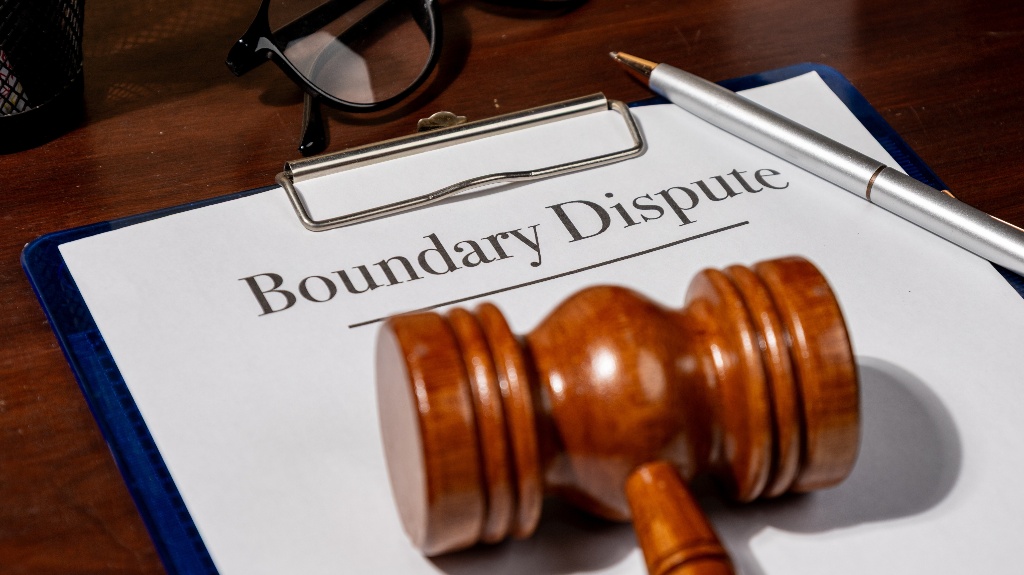
Disputes between neighbors are common, whether about property access, noise, loose pets, or children. Laws addressing property-based disputes range across many aspects of state and local laws, which are applied with particular judgment when community harmony is at stake. Authorities seek to uphold standards while ensuring fairness.
An attorney experienced in real estate law can help broker a dispute between neighbors, offering solutions that are a combination of legal tactics and compromise for the sake of civility.
Drawing the Line: Boundary Disputes
Many boundary disputes arise from misunderstandings. People believe they know where one property ends and the next begins, but are incorrect. Some may peg the line at a tree, a fence, or a driveway, only to learn that was never accurate. When the next door neighbor wants to make changes or improvements to their property, misunderstandings can flare into acrimonious disputes.
Descriptions of boundaries written into old deeds can mislead or be incorrect. These situations frequently lead to disputes between adjoining neighbors over a plan to construct a garage that seems too close to the property line, a driveway reconstruction that is called into question, or a fence that seems out of place.
Follow these steps to repairing a boundary dispute:
- Gather information from the county recorder’s office and city hall. Include deed descriptions, plat plans (the official map used by local government), and recent surveys (measurements taken by professional civil engineers to confirm lot lines and describe properties, these are often completed as part of a sale). Also look for written agreements, photos that detail historic usage, and other proof of use. Discuss the issue with your neighbor. If a disagreement persists, seek a compromise by splitting the cost of a professional surveyor.
- Mediation is less expensive and just as effective as an attorney. The Minnesota Judicial Branch offers a Homeowner Guide that describes solutions to property disputes. Mediation is available through the Judicial Branch, providing neighbors an opportunity to sit down with a professional “referee” and find compromise. They even allow people to write their own property line dispute solutions, which can be recorded on their deeds.
- An attorney can prepare you to petition the court for an Action to Determine Boundary Lines. This is a process by which evidence is submitted to a judge to decide. Bring copies of deeds, agreements, plat, and the town’s records on the property. The judge’s decision is legally binding and is recorded on the deeds affected.
- Adverse Possession is another legal principal often found in neighborhood disputes. This means the property owner has ignored the other person’s open and clear use of their property (often a small piece, like a sliver of yard) for a period of 15 years. That’s long enough in Minnesota for the user to be considered the owner of that small portion of land in question. Note that this cannot be claimed by residents with Torrens deeds
- Partition Fence Law applies to adjoining properties in agricultural areas. A judge or the township supervisors decide where the fence should be erected, splitting the cost between the disagreeing neighbors.

“Good fences make good neighbors,” wrote poet Robert Frost, but that’s only true if the fence was erected on the right part of the property. To avoid a legal dispute, try:
- Talking to your neighbor about the issue and coming to an agreement
- Gathering old records, agreements, and photos of property use
- Checking property lines before erecting a fence or outbuilding
- Making property line agreements in writing
- Investigating cost-sharing opportunities when fencing an area, a tactic that can elicit compromise
- Maintaining permanent boundary lines with stakes or markers after an official survey of the property
Resources for Reasonable Neighbors
Owning property is a significant milestone in life, and preserving the rights of ownership—even when an error has been made—ignites protective instincts. Understanding your rights and your role as a neighbor are keys to an amicable settlement. When other tactics fail, the attorneys at Waypoint Law can play a role, guiding your dispute through the process of a legal settlement that will be preserved on your deed.
